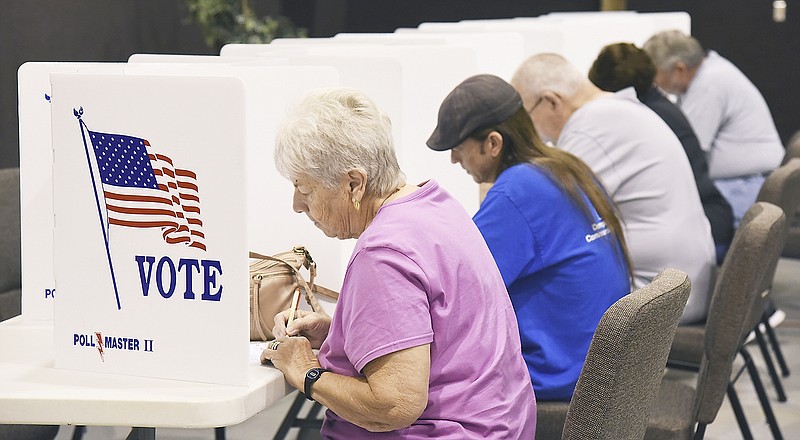When Missourians head to the polls March 10 for the presidential primaries, they can vote in whichever party's primary they choose - they just have to tell the poll workers which ballot they want.
With President Donald Trump all but assured the Republican party's nomination, Missouri Republicans could choose to vote for whichever Democratic candidate they'd prefer to see him run against. In a year with multiple competitive primaries, like 2016, an unaffiliated voter could vote for whichever candidate they like the most, regardless of party.
Not everyone thinks it's a good idea to let voters of different parties have a say in another party's nominations.
State Rep. Jered Taylor, R-Republic, proposed a bill that would "close" Missouri's primaries, requiring voters to register with a party to vote in its primary. It was heard by the House Elections and Elected Officials Committee on Wednesday.
The Republican and Democratic parties are private organizations, like Verizon or AT&T, Taylor said. AT&T doesn't let the Verizon Board of Directors elect its president because the Verizon board is only concerned with what's in the best interest of Verizon, he said. Under Missouri's open primary system, Democratic or Republican voters can vote in the other party's election, influencing the nominee of a party they don't support, Taylor said.
"That's not democracy, that's cheating, in my opinion," he said. "Even though it's allowed under law, it compromises the integrity of the vote."
Under Taylor's proposal, a voter could vote only in the primary of the party he or she is registered to. Someone registered to the Republican party could only vote in the Republican primary, a Democrat in the Democratic primary, a Libertarian in the Libertarian primary, a Green in the Green primary.
Unaffiliated voters couldn't vote for candidates in any primary; but if there are non-candidate questions like a constitutional amendment or local tax issue on the ballot, they could vote on those.
Taylor's bill would allow any party to opt out of the closed primary and run its own caucus or primary election at its own expense.
As it's written, Taylor's bill would go into effect in 2021, but he said he intends to change that to 2026 to allow voters and election officials more time to prepare.
Rick Watson, Henry County clerk and president of the Missouri Association of County Clerks, along with a few lawmakers on the committee, voiced opposition to Taylor's bill.
The bill would require voters to register with the party they want to vote in the primary of at least 23 weeks before the election, though Taylor said he was open to changing that. Candidates don't have to file for the Aug. 4 primaries until March 31 - 18 weeks before the election.
Watson said a lot of hostility some voters have shown toward poll workers are over issues with registrations, like if the voter didn't register before the four-week deadline or moved to a different county and didn't register again.
"If we add one layer of requirement that, should they have a change in philosophy, they would have to change their political party affiliation six months prior to the next primary election, I think that would cause frustration," Watson said.
State Rep. Kevin Windham, D-Hillsdale, said Taylor's bill could take away from the already limited voice Republicans have in St. Louis County elections. When voting on positions like county prosecutor, the winner is decided by the Democratic primary, Windham said. Republicans may want to vote for who they see as the less liberal option in that primary because they know they won't get a Republican elected, he said.
Windham wants to go in the opposite direction from Taylor, adopting the "top two" system used in Washington and California, where all candidates run on the same primary ballot and the top two face each other in a general election. His bill has not been assigned to a committee.
Nine states have primaries completely closed like Taylor is proposing. Fifteen states, including Missouri, have completely open primaries so voters can vote in any primary regardless of what party they're registered to.
Many states are somewhere in the middle. Seven states allow the parties to decide who can vote in their primaries. Nine states allow voters who haven't registered to a particular party to vote in any party's primary. Six states require voters to vote in the primary of the party they're registered to but allow them to change party affiliation up until they cast a ballot.
A few states run their elections in a completely different way, like Washington and California.
Louisiana completely forgoes primaries. All candidates run in the general election, and the top two candidates face each other in a run-off election if nobody gets a majority of the first round of votes.
A similar bill state Rep. Dan Stacy, R-Blue Springs, proposed last year narrowly received initial approval from the Missouri House of Representatives, but it was never voted on for final approval or advanced to the Senate.
Committee Chair Dan Shaul, R-Imperial, said he recalled testimony from last year that the proposal was an attempt by Republicans to limit Democrats' influence on elections. Presidential primaries this year have shown that's not the case, Shaul argued.
In South Carolina, some upstate Tea Party groups are encouraging Republican voters to take advantage of the open primary system and vote for Democratic candidate Sen. Bernie Sanders, according to the Spartanburg Herald-Journal.
On a website set up to coordinate the effort, backers said it's an extension of conservative radio host Rush Limbaugh's 2008 "Operation Chaos," where he encouraged Republicans in open primary states to vote for then-Sen. Hillary Clinton to prolong the Democratic primary process. In 2016, some liberal commentators encouraged Democrats in open primary states to vote for Sen. Marco Rubio to stop Trump, according to the Washington Post.

